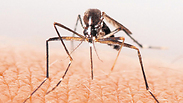
Deadly strain of West Nile virus hits Israel
Twenty-seven people have contracted a particularly vicious strain of West Nile virus in cities and towns all over the country; Health Ministry is closely monitoring the situation.
Four more cases were discovered in the Or Yehuda and Kiryat Ono areas, with two of the patients living on the same street. Three additional cases were diagnosed in Ramat Gan, two of whom live near the National Park area.
The number of people is not the only exceptional figure among the statistics, the level of infection and symptoms as a result are relatively severe: Two of the patients suffered damage to their central nervous system as a result of the virus, with at least five others requiring artificial respiration, and one patient passing away as a result.
Most of the patients were hospitalized at the Sheba Medical Center in Ramat Gan. The head of Sheba's infectious Disease Unit, Prof. Galia Rahav said, "In the last three months we have seen a large uptake in patients suffering from West Nile virus, leading to significant neurological damage. Most of the patients arrived with encephalitis or infections of the brain, cramps, and a decline in consciousness."
Prof. Rahav added, "We have also assessed different psychiatric changes. The condition of two of the patients has improved, an additional patient was sent to neurological recovery, and a few of the patients still require artificial respiration."
"We are talking about a really tough disease, which typically presents itself in the form of an infection of the brain, and often the spinal cord as well. We also perceived symptoms which we were unfamiliar with. Some of the patients suffered from symptoms mimicking Parkinson's Disease and polio, to the point of paralysis. It's too early to declare the current batch an outbreak, but we are following new cases very closely," Prof. Rahav said.
Previously unknown symptoms which were discovered for the first time at Sheba were purveyed to the rest of the world. One of the symptoms was the renewed infection of patients who had previously contracted the virus, and later recovered.
"In some of the cases the symptoms of the second infection in the patient were much more sever than the first infection. Lab tests proved quite clearly that the patient was not suffering from the same strain of the virus," Prof. Rahav said.
West Nile virus is typically contracted as a result of a bite from a mosquito which has fed on the blood of an infected bird. Most cases are usually light in nature, and tend to imitate the average flu, including headaches, fever, weakness and rashes. But some of the patients develop a severe infection of the brain and spinal cord, which can lead to the their death.
Up until now, infected mosquitoes have been discovered in 10 areas across Israel, including: Hadera and Sde Eliyahu in the north, Or-Yehuda in the center, the Sharon region, the Beit Shemesh area, and Sderot, Yotveta and Eilat in the south.
The Health Ministry has said in response: "West Nile virus is most prevalent from August to October, and as such, 23 out of the 27 cases were infected in August. Every case of infection is immediately reported to the Environmental Protection Ministry, which contacts local authorities in the area in order to conduct mosquito extermination, and treatment of standing water. Mosquito bite prevention is of primary importance."











